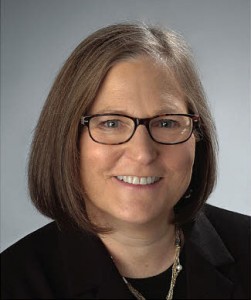DEGREE: B.A. in American studies; J.D., New York University; LL.M., Georgetown University Law Center
JOB TITLE: Syracuse University College of Law’s Bond, Schoeneck & King Distinguished Professor; Laura J. and L. Douglas Meredith Professor for Teaching Excellence; Professor of Law; director, Disability Law and Policy Program; and co-director, Center on Human Policy, Law, and Disability Studies
FAVORITE TRINITY MEMORY: The friendships I made. Perhaps my best “memory” is meeting my classmate Susan Kepnes, who later introduced me to her brother, Steven, who became my husband. We have been married for 28 years.
REPORTER: What is Syracuse’s Center on Human Policy, Law, and Disability Studies?
KANTER: The CHPLDS is a university-wide center on research and advocacy on disability. Our center is an umbrella for several disability-related academic programs throughout the university, including the Disability Law and Policy Program (DLPP), which I founded and direct. The DLPP houses the first joint-degree program in law and disability studies and an LL.M. program in international and comparative disability law, a Disability Rights Clinic, and a certificate program in disability law and policy.
REPORTER: What led you toward a career in disability law?
KANTER: I came to disability law before it was even a field of law in the early 1980s. I was trained as a civil rights lawyer. I wanted to use my legal talents to work for the rights of people labeled as disabled to live in homes in the community, to make their own decisions about their lives, and to be treated as equal members of our society rather than as isolated, forgotten, and often neglected, abused, and stigmatized people within society. Although we as a country have made great progress to combat discrimination against people with disabilities, prejudice and discrimination against people with disabilities continue today in the United States and throughout the world. Most of my work today is working with organizations and governments in different countries to enforce the rights of people with disabilities under international and domestic disability laws.
REPORTER: Of what accomplishment in your career are you most proud?
KANTER: First, I am most proud of my former students who are now working as disability rights lawyers in the United States and internationally and of the Ph.D. students whom I have supervised who are now teaching, writing, and teaching disability studies in various countries around the world. I am also proud to have been involved in helping to draft the U.N. Convention on the Rights of People with Disabilities (CRPD), adopted by the U.N. in 2006 and which establishes for the first time the right of people with disabilities to equality and protections under international law. Soon, my book on the CRPD, titled From Charity to Human Rights: The Development of Disability Rights under International Human Rights Law, will be published. I am also proud of the interdisciplinary disability studies program we have developed at Syracuse, one of the first and largest in the world. As a result of this interdisciplinary work, I recently co-edited a book that seeks to integrate disability studies theories into law and education, titled Righting Educational Wrongs: Disability Studies in Law and Education (with Beth Ferri). But, most of all, I am proud of my two wonderful children, Rachel and Ari.
REPORTER: You’ve written about disability issues in education. What would you say is the biggest challenge related to disability issues that American education needs to confront?
KANTER: The most important issue remains the need to eliminate stigma and unfounded assumptions about children and young adults with disabilities in our education system, from preschool through higher education. Today, many students with all types of disabilities are graduating from our nation’s high schools. Some will go on to college and easily succeed; others may struggle at colleges and universities to get the accommodations they need and to which they are legally entitled. Far too many students still face prejudice from professors who assume that accommodations are just a way for students to “get an unfair advantage” or worse, that students with certain disabilities are not “suited” for professions such as medicine or law. Other high school graduates with disabilities may want to attend universities or colleges but are kept out. Today students with intellectual disabilities are seeking to continue their education beyond high school, and many universities, such as Syracuse, have developed innovative programs to support these students to participate in the life of the university. More such programs are needed. Disability is part of human diversity. Universities and colleges have an important leadership role, in my view, to leading the way toward inclusion and acceptance of people from all sorts of diverse backgrounds, including people who are considered disabled or “different” based on how they may walk, hear, see, act, or speak.
REPORTER: Did a particular professor at Trinity have an impact on you? If so, who and why?
KANTER: Yes, Ronald Spencer was my adviser. Although I probably disappointed him by not pursuing my Ph.D. in American studies, as he had urged me to do, I hope that he is happy to know that I put his wonderful teaching and sage advice to work for good causes within the academy–the legal academy, that is. I also appreciate the mentoring of Eugene Leach, who arrived at Trinity about the same time I did, and who worked with me to fashion my own major in American studies. He went on to build up the American studies program, which has become one of the most popular majors at Trinity.

